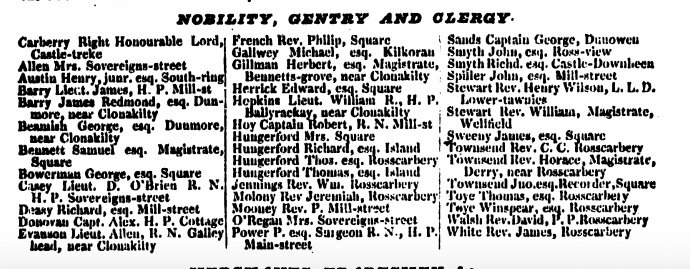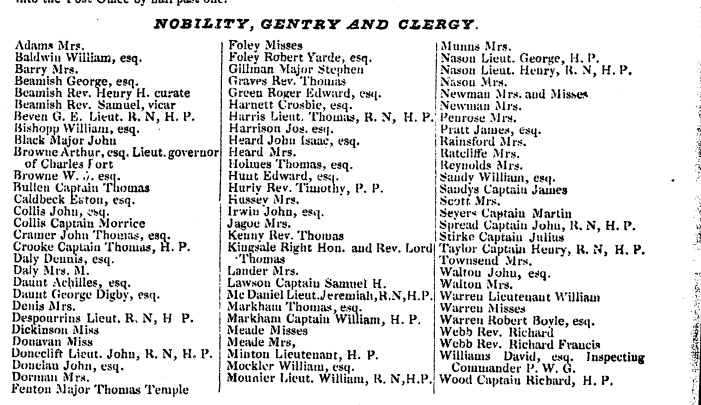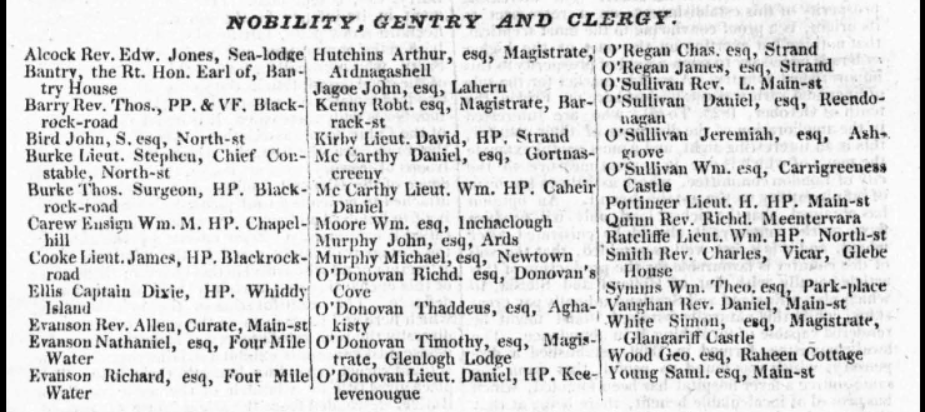1824, Half Pay Officers from Napoleonic Wars Bantry District.
The initial HP is half pay. Lieutenant Daniel O’Donovan may have been the last survivor of the Irish Brigades. After the French Revolution they were give the option of transferring en masse to the British Army retaining their rank.
Post Napoleonic War Officers on Half Pay Bantry, West Cork 1824 and Lieutenant Daniel O’Donovan, Keelevenougue, last of the Irish Brigade d 1830s.
On the Catholic Gentry and Middle Class in 1828 some months before he was elected to the British Parliament, Daniel O’Connell giving evidence to a Select Committee said that most of the cash on deposit and most of the shares in the Bank of Ireland was held by Catholics. He was complaining that of the management staff only four trainees were Catholic. This was an enormous change. c 1780 a listing of the Bank of Ireland shareholders shower the La Touche family as the largest with over 20% followed by the great landed magnates.
Pigot’s Directory lists,
Lieutenant Stephen Bourke, Chief Constable, North-street,
Lieutenant Thomas Bourke, Surgeon half Pay, Blackrock Road. (it may have been with him that JJ Callanan the poet stayed and composed ‘Gougan Barra’
Ensign William Carey, Ensign, Chapel Hill,
Lieutenant James Cooke, Blackrock Road,
Lieutenant David Kirby, Strand,
Lieutenant William Mccarthy, Caheir Daniel,
Lieutenant Daniel O’Donovan, Keelevenouge, area on north of Muintervara peninsula opposite Beara where Carew embarked re Siege of Dunboy. He when he died it was said he was the last of the Irish Brigade. He was probably a relative of Timothy O’Donovan, of O’Donovan’s Cove, on the Peninsula a small landowner and one of the first Catholic Magistrates,
Lieutenant H Pottinger, Main-street,
Lieutenant William Ratcliffe, North-street.
The Bantry historian Paddy O’Keeffe said there were 12 half pay officers in Bantry in the period.
Before the French Revolution many of the old Gaelic families sent their sons to serve in the various Continental Irish Brigades. This changed with the French Revolution and the relaxing of the Penal Laws. From around 1790 many young men from this class joined the British Army or Navy.
In a somewhat disparaging remark in the Kenmare Estate papers 1760 (online Irish Manuscript Commission, it was said of the Catholic Middle men that they rack rent their tenants, have no interest in improving only in getting daughters married, sons in the Irish brigade or as priests.
In the Bantry area and Kerry many of the old families continued on the Bantry and Kenmare and Petty Estates as agents or middle men.
Military Service some West Cork personnel:
https://docs.google.com/spreadsheet/ccc?key=0AqhnQGE3ANjzdEY1U09tUm4zUWNvcFBmTllEdVZMaEE#gid=0
ntry-west-cork-grievance-of-opulent-catholics-excluded-from-quarter-sessions-juries-in-preference-to-protestants-having-no-property-but-a-half-pay-of-40-a-year/
| 1810, 1831, 1840, 1846 | Dr. Thomas Burke | 1824, Surgeon, HP, Blackrock-road (NGC). Possible The Square, 1810 Thomas Burke Half Pay Surgeon married Margaret McCarthy, (1784-1831), possibly through her he acquired lands at Caheragh, she was likely of the Muclaghs (Clann Tighe Roe Scartaigh) and the lands from McCarthy Gurtnascreena. | May be from Caheragh the person that poet JJ Callanan stayed with for around 2 years when he wrote Gougan Barra and Lamesnt to Morty Oge. memorial to Father Walsh PP leaving Bantry. Attending Great Meeting re Poor Law in 1840, Bantry, gave a speech promoting reclamation of waste, mine development, employment rather than charity. 1846 distress meeting Bantry. | 1832 contacted fever attending Cholera Hospital Bantry voteof thanks by John Y. Kingston.Southern Reporter and Cork Commercial Courier 28 April 1831.Viscount Berehaven expressed regret in 1841 at his resignation for 15 yearas as Dispensary Docotr. | The 1815 lArmy ist and from it I find that Thomas Burke joined the army on the 14th August 1808. His rank was Assistant Surgeon. He served in the 1st Garrison Battalion which most likely was based in Ireland (They manned the home Garrisons, Kinsale, Bantry etc) He was disbanded from the service in 1814 on the cessation of hostilities with France and the surrender of Napoleon.He appears to have been on 72% pay. Army surgeons often had no real medical training and they learned as they went. The saw was one of their main instruments. Thomas Burke did not go to Trinity but perhaps had some Medical Training in such place as the College of Surgeons. It might be worth contacting them. | Possibly Thomas Burke MD, Skibbereen, died 1859 estate £1,500 executors James Crowley Merchant Cork, Father Francis Casey, Curate, North Parish Cork. |
Macroom:

Clonakilty:

Kinsale:

Skibbereen:

Bantry:


Interesting – another view of the better-off Catholics.
LikeLike
Reblogged this on West Cork History.
LikeLike
Pingback: 1825. Bantry, West Cork. Grievance of Opulent Catholics (John O’Connell, Bantry) excluded from Quarter Sessions Juries in Preference to Protestants Former Officers Having No Property but a Half Pay of £40 a Year, | West Cork History